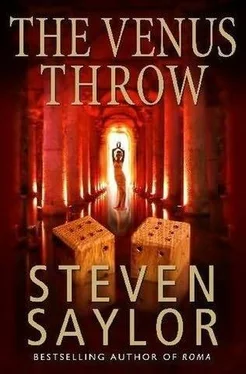Steven Saylor - The Venus Throw
Здесь есть возможность читать онлайн «Steven Saylor - The Venus Throw» весь текст электронной книги совершенно бесплатно (целиком полную версию без сокращений). В некоторых случаях можно слушать аудио, скачать через торрент в формате fb2 и присутствует краткое содержание. Жанр: Исторический детектив, на английском языке. Описание произведения, (предисловие) а так же отзывы посетителей доступны на портале библиотеки ЛибКат.
- Название:The Venus Throw
- Автор:
- Жанр:
- Год:неизвестен
- ISBN:нет данных
- Рейтинг книги:3 / 5. Голосов: 1
-
Избранное:Добавить в избранное
- Отзывы:
-
Ваша оценка:
- 60
- 1
- 2
- 3
- 4
- 5
The Venus Throw: краткое содержание, описание и аннотация
Предлагаем к чтению аннотацию, описание, краткое содержание или предисловие (зависит от того, что написал сам автор книги «The Venus Throw»). Если вы не нашли необходимую информацию о книге — напишите в комментариях, мы постараемся отыскать её.
The Venus Throw — читать онлайн бесплатно полную книгу (весь текст) целиком
Ниже представлен текст книги, разбитый по страницам. Система сохранения места последней прочитанной страницы, позволяет с удобством читать онлайн бесплатно книгу «The Venus Throw», без необходимости каждый раз заново искать на чём Вы остановились. Поставьте закладку, и сможете в любой момент перейти на страницу, на которой закончили чтение.
Интервал:
Закладка:
"There wouldn't have been much evidence if it was done the way that Marcus Caelius implied," said Bethesda.
"And how was that?"
She sat back and cocked her head. "Remember that this was said in a court of law, before a mixed audience of men and women alike, not in a tavern or at one of his orgies. Marcus Caelius is a very brazen young man." She did not sound wholly disapproving.
"And a brazen orator. Well, out with it. What did he say?"
"According to Caelius, the quickest of all poisons is aconitum."
I nodded. Many years of investigating the sordid means of murder have given me some familiarity with poisons. "Aconitum, also called panther's-death, harvested from the scorpion-root plant. Yes, its victims succumb very quickly. But when swallowed in sufficient amount to cause death, there are usually noticeable reactions in the victim and plentiful evidence of foul play."
"Ah, but according to Caelius, the poison was not swallowed."
"I don't follow you."
"According to Caelius, if aconitum touches a woman's genitals, she will die within a day."
I raised an eyebrow. Even with all my experience of poison, this bit of information was new to me, and I was not sure I believed it. "What Caelius says is possibly true-though I'm inclined to wonder how anyone could ever have discovered such a curious thing. But then, I suppose there's not much that Marcus Caelius doesn't know about female genitalia."
"Ha!" Bethesda's eyes sparkled. "Even Cicero didn't come up with that one."
I turned up my palms to show modesty. "So, Caelius accused Bestia of having poisoned his wives by… " I left the sentence unfinished. There seemed no delicate way to complete it.
"He did not accuse Bestia outright. Having stated the properties of aconitum, and having worked himself up to a feverish pitch, Caelius pointed his finger at Bestia and shouted, 'Judges, I do not point the finger of guilt-I point at the guilty finger!' "
I choked on a mouthful of porridge. "Outrageous! Just when I was beginning to think that Roman orators had degraded their craft to the lowest level of indecency and bad taste, along comes a new generation to push the limit even further. Oh Minerva," I added under my breath, glancing out the window at the statue in the garden, "preserve me from a day in court! 'I point at the guilty finger.' Ha!"
Bethesda sipped from her cup of honeyed wine. "Anyway, Bestia was acquitted, finger and all."
"I suppose Cicero made a stirring speech for his defense."
She shrugged. "I don't recall."
Cicero's speech would probably have made a greater impression on her, I thought, had the man delivering it been as young and good-looking as Marcus Caelius.
"Fortune smiled on Lucius Calpurnius Bestia, then."
"Though not on his wives," said Bethesda dryly. There was a flash of something like anger in her eyes, but then a smile crept across her lips. "Speaking of young Caelius reminds me of another bit of gossip from the Forum," she said.
"Also involving Caelius?"
"No, involving his landlord."
"I see. And what fresh outrage has Publius Clodius perpetrated now?" Clodius owned the apartment building down the street, the one in which Caelius had his lodgings. In his mid-thirties and a patrician of impeccable lineage, Clodius had made himself much feared in recent years as a rabble-rouser and exploiter of populist resentments. It was Clodius, as tribune, who had masterminded the Roman takeover of Cyprus in order to finance his scheme to pass out free grain to the people of Rome. Once friendly to Cicero, he had almost single-handedly engineered Cicero's exile and was now his archenemy. His political tactics were crude, relentless and often violent. Just as men like Caelius were pushing the boundaries of oratory in the courts, men like Clodius were pushing the boundaries of political intimidation. Not surprisingly, the relationship of the two men went beyond that of landlord and tenant. They had become frequent political allies, and they shared a personal bond as well. It was well known that Caelius was the lover, or at least one of the lovers, of the rabble-rouser's widowed older sister, Clodia.
"Well, I didn't witness the incident myself, but I heard about it at the fish market," said Bethesda, practically purring. "It seems that Pompey was down in the Forum, arriving with his retinue at some trial or other that was about to begin."
"Could this have been the trial of Pompey's confederate Milo, for breach of the peace?"
Bethesda shrugged.
"With Clodius acting as prosecutor?" I added.
"Yes, that was it, because Clodius was there with a large retinue of his own, made up of some very rough types, apparently."
To describe Clodius's notorious gang of troublemakers as "rough" was to understate the case. These were strong-armers of the lowest order, some hired, some obligated to Clodius for other reasons, some voluntarily in his service to sate their appetites for violence.
For a man like Clodius to be prosecuting anyone for breach of the peace seemed ironic, but in this case the charge was probably justified. The accused, Milo, had his own rival gang of ruffians ready to rampage through the streets supporting whatever political cause their master happened to favor at the moment. Where great men like Pompey, Caesar and Crassus contested one another in exalted spheres of financial and military prowess, vying for mastery of the world, Clodius and Milo strug-gled with one another for immediate control of the streets of Rome. The greater powers allied themselves with these lesser powers for their own purposes, and vice versa. At the moment, Milo was Pompey's enforcer in Rome, so Pompey was obligated to speak in Milo's defense. Clodius, whether acting for Caesar, or Crassus, or entirely on his own, appeared to be badgering Milo chiefly to get at Pompey. Clodius seemed determined to undermine Pompey's attempts to take control ofthe notorious Egyptian situation…
This chain of thoughts caused me to remember my visit from Dio the previous month, and I suddenly felt uneasy. "By the way," I said, "do you remember the odd pair who visited me on the day before I left for Illyria? I was wondering if you had heard from them, or if you knew-"
Bethesda gave me her Medusa look. Her anecdote was not to be interrupted. "There was a great crowd gathered for Milo's trial, too many to fit into the open square where it was being held, so the mob spilled out into the nearby streets. When Pompey appeared, there was much cheering from the crowd. You know how the people adore Pompey."
"The Conqueror of the East."
"Exactly. But then Clodius appeared atop some high place and began shouting to the mob below, which was apparently packed with his sup-porters. Most people were too far away to hear what he was shouting, but whenever he would pause the mob below him would cry out with one great voice, 'Pompey!' Even those too far away to hear Clodius or even see him could hear the name of Pompey being shouted in unison. It was like a slow chant: 'Pompey!' A pause. 'Pompey!' A pause. 'Pompey!' Well, apparently Pompey heard his name being called, for they say he pricked up his ears and broke out in a broad grin, then changed his course and began making his way toward the shouting, thinking he was being lauded by the crowd."
"A typical politician," I remarked, "beating a path toward his adoring supporters like a calf heading for the teat."
"Except that this milk was sour. As he drew closer, the smile vanished from Pompey's face. First he saw Clodius, pacing back and forth atop the ledge, addressing the mob below and clutching himself with laughter whenever they responded with the cry of 'Pompey!' When Pompey drew close enough to hear what Clodius was shouting, he turned the color of a hot flame."
"And what set Pompey's cheeks ablaze?"
Читать дальшеИнтервал:
Закладка:
Похожие книги на «The Venus Throw»
Представляем Вашему вниманию похожие книги на «The Venus Throw» списком для выбора. Мы отобрали схожую по названию и смыслу литературу в надежде предоставить читателям больше вариантов отыскать новые, интересные, ещё непрочитанные произведения.
Обсуждение, отзывы о книге «The Venus Throw» и просто собственные мнения читателей. Оставьте ваши комментарии, напишите, что Вы думаете о произведении, его смысле или главных героях. Укажите что конкретно понравилось, а что нет, и почему Вы так считаете.










